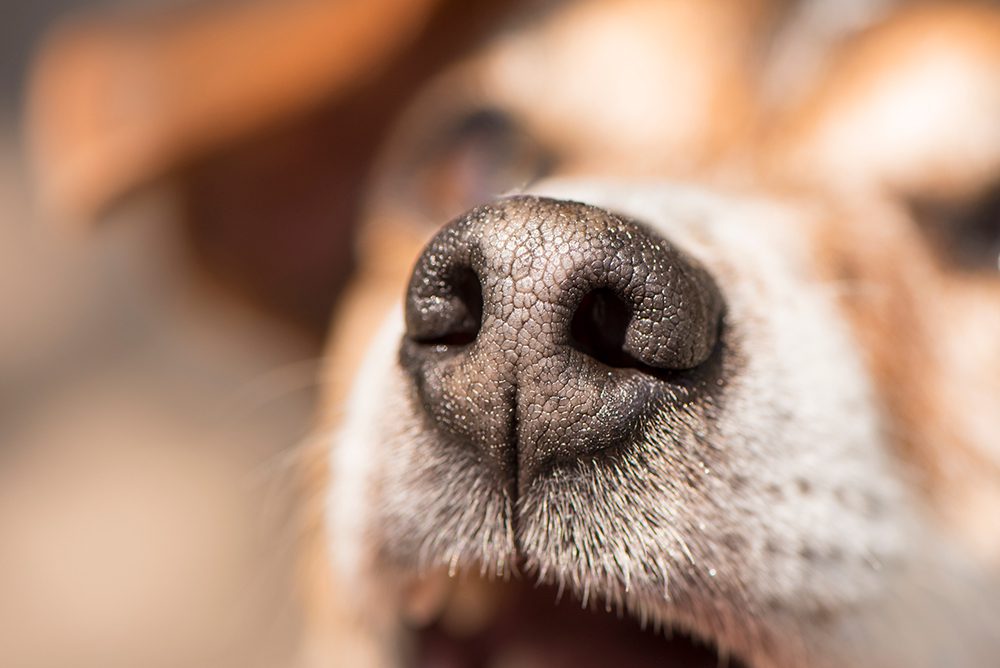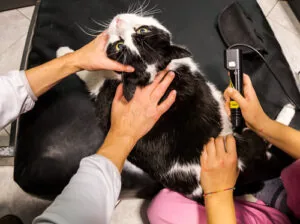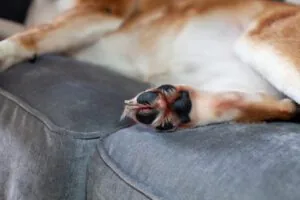Why is my Dog’s Nose Dry?

The dog’s nose is an incredible organ, boasting a sense of smell far superior to our own. So when that usually moist and cool nose seems persistently dry, it’s natural to worry. In this comprehensive guide, we’ll answer the question, “Why is my dog’s nose dry?”, explore possible causes, offer at-home remedies, and let you know when it’s time to visit us at Dyer Animal Clinic in Dyer, Indiana.
The Canine Nose: An Overview
To understand why a dog’s nose might be dry, it’s helpful to know a bit about the canine nose. The damp surface, known as the rhinarium, helps to trap scent particles, enhancing a dog’s already impressive sense of smell. This moisture comes from various sources, including glandular secretions and a dog’s licking. However, the moisture level can fluctuate throughout the day.
Is a Dry Nose a Cause for Concern?
A dry dog nose doesn’t always indicate a health problem, but sometimes, it could be a sign of underlying issues. To distinguish between the two, we need to consider the context and associated symptoms.
The Normal Dry Nose
Dogs’ noses can be dry after waking up from sleep due to reduced activity and lack of licking. Environmental factors like heat, cold, and dry air can also temporarily affect nose moisture.
The Abnormal Dry Nose
A dry nose becomes potentially concerning when it’s chronically dry, cracked, or accompanied by other changes like discoloration, sores, or change in behavior.
Unraveling the Causes of a Dry Dog Nose
Several factors can contribute to a dry nose in dogs.
Environmental Factors
- Dehydration: Insufficient water intake can lead to a dry, cracked nose, emphasizing the importance of providing ample fresh water for your pet.
- Weather Conditions: Cold winters can chap and dry out a dog’s nose, much like human skin, while hot, dry weather can lead to dehydration.
- Allergies: Allergic reactions to foods, chemicals, or materials can manifest in a variety of ways, including a dry or irritated nose.
Health Conditions
- Autoimmune Disorders: Conditions like Lupus or Pemphigus can lead to crusty sores, ulcers, or change in the nose’s color.
- Brachycephalic Syndrome: Short-nosed breeds often struggle with dry noses due to breathing difficulties.
- Keratoconjunctivitis Sicca (Dry Eye): This condition can cause dryness in both the eyes and the nose.
DIY Solutions for Your Dog’s Dry Nose
Before visiting a vet, you might explore a few safe home remedies:
- Hydration: Encourage your pet to drink more water. You can also moisten their food to increase fluid intake.
- Humidifier: Using a humidifier, especially in dry conditions, can help maintain moisture in your dog’s nose.
- Pet-safe Nose Balms: These products offer relief from dryness and protect against environmental factors.
Remember, while these DIY solutions can provide temporary relief, they should not replace professional veterinary advice, particularly if your pet’s condition persists or worsens.
When to Reach Out to Your Dyer Veterinarian
A persistent dry nose, coupled with symptoms like loss of appetite, lethargy, unusual nasal discharge, breathing difficulties, or visible sores, warrants immediate professional attention.
Symptoms That Require Immediate Attention
Seek immediate help if your pet has a nosebleed, struggles to breathe, or shows signs of extreme discomfort or distress.
Seeking Professional Help
If you notice persistent dryness despite home care, or if your dog’s dry nose is accompanied by other concerning symptoms, it’s time to contact Dyer Animal Clinic.
Dyer Animal Clinic: Your Partner in Canine Health
At Dyer Animal Clinic, we’re committed to offering the best care for your pets. Our dedicated team of professionals is ready to answer your concerns and provide appropriate treatment for your furry friend’s dry nose.
Don’t hesitate to call us at (219) 865-3737! We’re here to ensure that your pet’s health is always a top priority. We’re only a call or a click away.
Share This Post
Recent Posts
About Dyer Animal Clinic
We are a place where pets and their people can feel at home. It's a place where wellness is maintained and supported from the time they’re newborns through their golden years.






